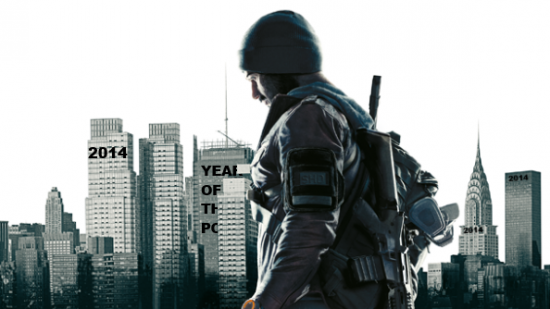It’s hard not to get excited about a new year of of PC gaming, but 2014 is notable. PC games have been changing, and this year will be no different. MOBAs are massive now, singleplayer and multiplayer are no longer considered mutually exclusive, and a whole batch of Kickstarter babies are due to be born. Not only that, but with the “next-gen” of consoles now here, developers are free from the shackles of almost decade-old hardware, free to work with machines much closer to the PC when crafting multiplatform games.
From the mists of the future, we’ve picked a selection of titles that we believe are going to stand tall in 2014. It goes without saying that we think these games will be good, but we also consider these games important. These are the games that will carve out new pathways and set trends in the PC sphere that will become commonplace in years to come.
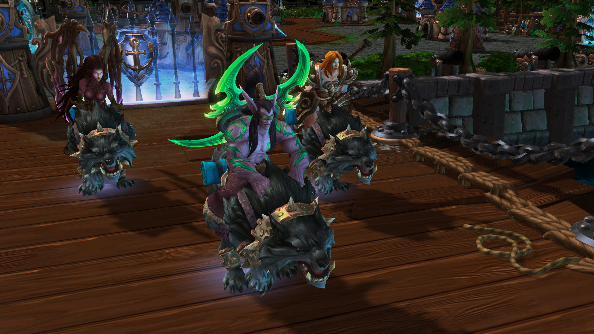
Heroes of the Storm
Blizzard’s contender in the fight for the MOBA throne, Heroes of the Storm is a 5v5 free-to-play arena game with several gameplay modes.
Despite one of their games hosting and birthing the entire genre, Blizzard chose to sit out Moba’s and Dota clones. From their perspective, World of Warcraft consumed every developer they could throw at it, and the subscription fees more than justified the choice.
Then League of Legends and Dota 2 happened, and it looked like Blizzard were choosing to sit out the entire genre.
Heroes of the Storm is Blizzard’s response: a ‘Hero Brawler’ (it’s always fun watching a company engage in linguistic gymnastics to avoid mentioning their competitors) that pitches Blizzard’s characters against each-other in short skirmishes. Its point of difference is in game design: there are more scenarios beyond a traditional tri-lane map, there are deliberate efforts to simplify the mechanics to allow for clarity in both play and spectating, and matches are intended to be shorter.
But Heroes of the Storm is by no means a guaranteed smash. For the first time, Blizzard are launching themselves into a market where they’re the clear underdog. League of Legends and Dota 2 are well entrenched, and there’s no way they’ll let a competitor like HOTS into the market without extracting a price.
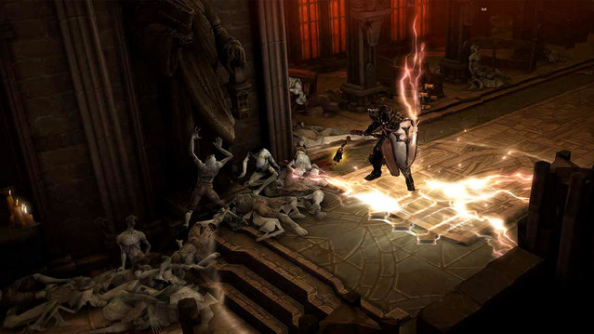
Diablo III: Reaper of Souls
The expansion pack for Diablo III, Reaper of Souls bolsters the base game with a new character class, new quests, extra enemies, and a fresh collection of lootable items.
If you’re in charge of Blizzard’s spreadsheets, it’s hard not to look at Diablo III as an unqualified success; becoming the most pre-ordered PC game in history and eventually selling over 14 million copies. But… it launched badly, and the end-game was made meaningless by the introduction of a pay-to-own auction house. The auction house will be turned off in March 2014; Reaper of Souls should launch later in the year. The question is will all those players who felt misled over the auction house return to Sanctuary?
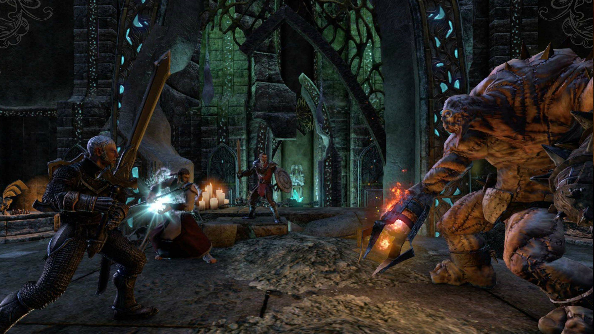
The Elder Scrolls Online
Bethesda’s massively multiplayer game set in the Elder Scrolls universe, TES:Online takes the epic feel of Skyrim and Oblivion and opens it up to hundreds of players.
It’s not that the Elder Scrolls: Online feels like a risk. It feels like a ferociously expensive risk – with a rumoured development bill of over $200m, and even more to be spent on marketing and advertising the game.
The hurdles facing the Elder Scrolls Online are vast. There’s the natural skepticism of the traditionally single player audience towards a subscription based MMO. There’s the scale of the content required to keep players online after their free month runs out. There’s the competition: Wildstar and the next World of Warcraft expansion are both ready to suck money from players pockets. Most of all, though, there’s the carcasses of subscription MMOs that Zenimax Online have to step over on their way to success: games like The Old Republic, Rift, Tera, Warhammer Online and The Secret World all suggest that gamers aren’t interested in a subscription MMO that isn’t called Warcraft.
It’s out in just over four months. Squeaky bum time.
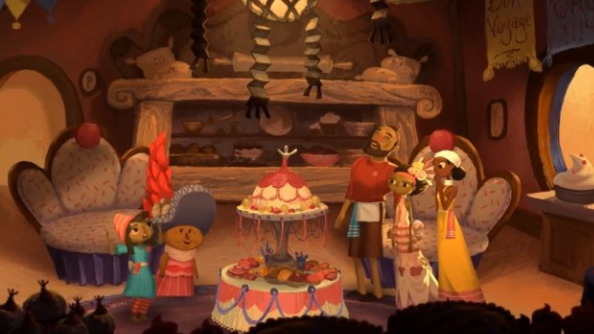
Broken Age
The original Kickstarter success story, Broken Age is a traditional point-n-click graphic adventure game depicting the lives of two lonely children from different time periods.
Almost two years ago Double Fine’s crowd-funded adventure game Broken Age demolished Kickstarter records by guzzling up over $3.3 million in eager backers’ cash. That’s eight and a bit times the sum the studio asked for, leaving Double Fine with golden buckets of money just sitting around stinking up their offices. But the goodwill in which the cherished Double Fine were once drenched has seemingly began to evaporate: progress updates on Broken Age have at times been vague, release dates have slipped and costs have spiralled beyond even the relatively huge sums of cash donated by their most trusting fans.
Double Fine’s decision to soft-launch Broken Age with an Early Access version in 2014 in order to fund further development of the game stuck a honey-grabbing paw into an already agitated fanbase hive, and the announcement of Frodo Baggins as one of the game’s voice actors then rightly prompted questions about how and where the Kickstarter cash was being spent. It’s like lending your friend a tenner for some lunch and seeing him stroll out of a shop with a pack of cigarettes. Except the cigarettes are Elijah Wood.
Thing is, all of the component parts of an incredible game are still in place, the medium’s funniest writers and best 2D artists all in a little box, working away on something that we must collectively and quietly trust will be completed one day. It will be a small miracle however, if Broken Age finds its way to full release without eroding some faith in the Kickstarter funding model, or dismantling a decade of goodwill for one of the most loveable underdog studios there is. Broken Age could be the game that turns Double Fine rotten.
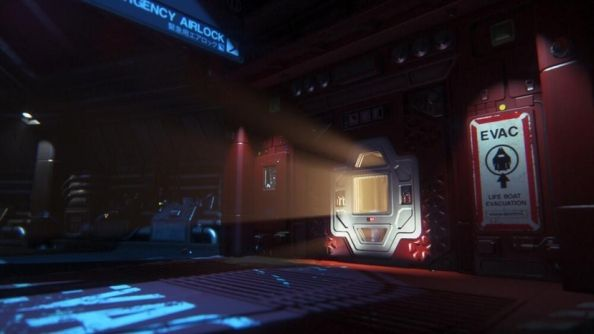
Alien: Isolation
A secretive project in development at Total War studio Creative Assembly, Alien: Isolation is believed to be a survival shooter in which a single alien xenomorph stalks you through a space station.
Leaked concept art suggests the announcement of a new Aliens game is near; a prospect about as welcome as a farting facehugger given last year’s Colonial Marines. Somehow, after Gearbox and Sega’s spectacular implosion, the newly minted console team at Creative Assembly have to address the shortcomings of the previous game, convince us that they can release a game with a level of polish they’ve previously been unable to reach (Ave! Rome II), and pitch a new take on the IP that breathes a bit of new life into the cliché Aliens games have become. This feels like the Aliens’ franchise last chance of redemption, all in the hands of an unproven shooter team.
That’s quite a tall order.
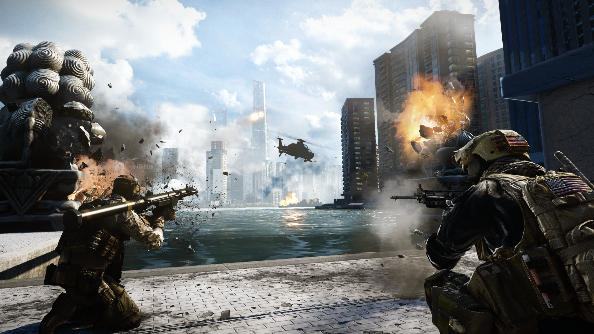
Battlefield 4
Offering large-scale FPS multiplayer combat with a variety of vehicles and tactical opportunities, DICE’s Battlefield 4 was one of 2013s biggest releases. Unfortunately, it launched in quite a sorry state.
EA’s 2013 was defined by two high profile disasters on PC: SimCity and Battlefield 4. Both launches were farcical, revealing game-breaking bugs, servers that couldn’t take the stress of players using them and red-faced apologies from the developers. SimCity is probably beyond redemption, but Battlefield 4 can and should be fixed. Getting that game up and running and delivering on their goals for Premium should be DICE’s first priority.
But the importance of Battlefield 4 goes further. It’s been held up as the test case for Mantle, AMD’s programming interface that should allow developers closer access to an AMD card’s rendering power. While other games have been showcased using Mantle (here’s a test strategy game created by newcomers Oxide Games) it’s Battlefield that will prove Mantle’s mettle. If AMD owners are offered a clear performance advantage in one of the PC’s most popular FPS games, that will create a clear advantage for AMD’s card sales going forward, and reshape the PC tech landscape for the next two years.
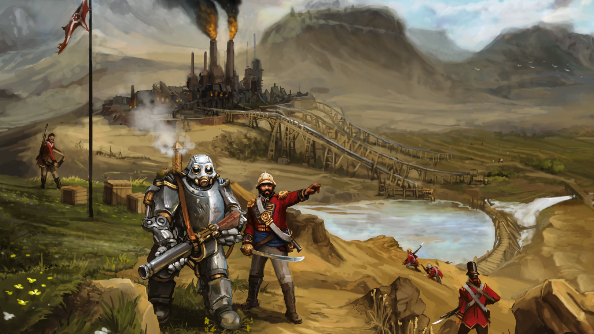
Clockwork Empires
A steampunk city-building sim where danger not only comes from mismanaged finances, but the threat of Lovecraftian gods and monsters.
Most of us just wanted bigger city sizes in SimCity. That, and perhaps a slightly less exhaustive focus on wastewater treatment.
But Clockwork Empires is going above and beyond what is expected from a city-builder by introducing elements of Victorian steampunk, colonialism, and even sinister Lovecraftian Elder Gods who must be held at bay even as you lay down roads and build schools. The overall flavor seems to be a cocktail of Dwarf Fortress and Blackadder.
It’s a welcome and much-needed change of pace from SimCity’s strange attempts at realism and persistence, or the Anno series’ intricate optimization puzzles. What is perhaps most exciting is that this is one city-builder where improbably bad things happening actually makes sense within the game’s rules. Unlike a meteor just dropping out of the sky to flatten your Sims for fun and entertainment, disasters and the occult are just more factors to manage in Clockwork Empires. “Oh dear, the miners are on strike and a Kraken is laying waste to my harbor again. Welp, time to call out the guard.”
That is my kind of city-builder. More importantly, it’s one that could break the genre out its complacency.
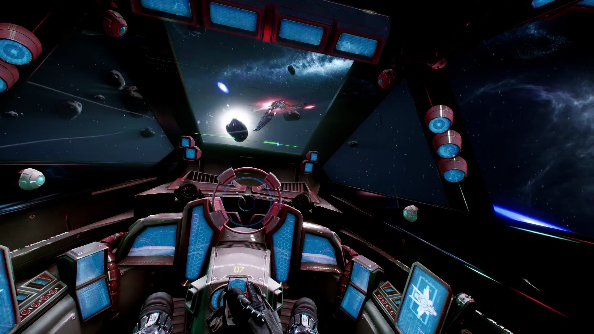
Star Citizen
Space-faring trade and combat makes up the core of Star Citizen, a Kickstarter project created by Wing Commander designer Chris Roberts.
35 million dollars comes with certain expectations. That’s the amount raised so far by Roberts Space Industries’ crowdfunding efforts. 35 million dollars, from Kickstarter backers, sales of spaceships costing more than $100/piece, and subscriptions to a game that’s still got a hefty chunk of development to go.
Star Citizen will spend 2014 under a microscope: press, community and gamers all peering in to see where the money gets spent. Expect any hint of failure or delay to make major headlines, and any playable code to be examined, streamed and let’s played ad infinitum.
EVE: Valkyrie
A space flight-simulator designed specifically for use with virtual reality equipment, Valkyrie is set within the same universe as MMO EVE Online.
As the first (announced) natively VR game, EVE: Valkyrie is probably the most exciting prospect in this list. It’s a space-shooter that creates new mechanics enabled by VR. Your missile locks are held by you moving your head towards the target, while your and your enemies ship tangles around an asteroid belt.
In its current iteration, it’s brilliant knockabout fun. But there are question marks over Valkyrie. How will it connect to the Eve universe (development on Valkyrie is taking place in CCP’s Newcastle studio, previously responsible for Dust 514)? Can the simple space battles provide enough depth to draw you back? And, will it even release for PC? CCP have repeatedly refused to confirm it’s being built for the Rift, despite demoing it on Oculus headsets at trade shows and conventions. I have a sneaking suspicion they might be keeping their powder dry ready in-case Sony reveal a VR headset for the PlayStation 4.
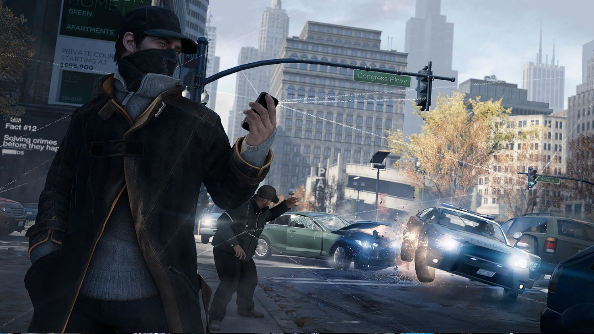
Watch Dogs
An open-world action game where hacking is as dangerous as shooting, Watch Dogs blends Assassin’s Creed with Grand Theft Auto’s gameplay in a conspiracy thriller.
You probably weren’t listening in on Ubisoft’s conference call for the fiscal year 2014/15, because you’re not a games newsbot. So it falls to us to tell you that Yves Guillemot’s disarmingly trebly continental lilt and balding brow conceal nerves of steel. The French publishers had just delayed their great next-gen hope, Watch Dogs, far beyond the launch dates of the new consoles – and shareholders were losing their shit, struggling with the maths of giving an already hugely expensive game another four months in the oven.
Here’s what they couldn’t understand: there’s no figure you can put on polish – on the goodwill that’ll pull players in for those sequels in 2016 and beyond. There’s no number to be applied to the loss of faith that Creative Assembly and DICE suffered last year in allowing Rome II and Battlefield 4 to leave their gates in frankly shocking state. But you can be sure those vague sentiments will lean heavily on their bank accounts in years to come.
Big, open-world games like these are made by astonishingly large teams now – and if Watch Dogs comes off, it’ll show that companies who aren’t Rockstar can ask up to 1000 people to make a game and expect it not to be a total mess. If not? Then a truly troubling zeitgeist has descended on this industry we depend on for games.
And there’s another thing: quietly, slowly, Watch Dogs’ new ideas will start to change peoples’ minds about Ubisoft as the huge homogenator behind an increasingly interchangeable set of sneaky-shooters. Imagine it’s 2007 again, and Assassin’s Creed 1 turns out to be everything we’d hoped. That’s the sort of mood Watch Dogs has the potential to generate in March.
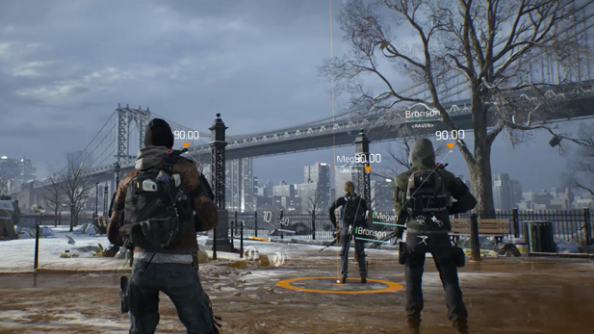
The Division
The big set-piece of E3 2013, The Division is an open-world third-person shooter that takes place in a persistent multiplayer environment.
There are a few things happening with The Division that make it one of the year’s most interesting games. First, Ubisoft are hellbent on finding ways to make their games more comprehensive “second-screen” experiences, but they’ve yet to find a compelling reason why you should be signing into your PC game via tablet while riding the train to work. With The Division, Ubi are trying once again to get you playing their game even when you’re not near your main gaming machine. They might have hit on something by having certain support roles playable via other devices, so that you can contribute to your team even when you’re on the go.
Projects like this are going to determine whether “second screen” ever becomes more than a buzzword. The possibilities for having games work across your entire stable of household electronics are certainly interesting. But The Division has to make its mobile aspect fun for its own sake, not just a bullet-point feature that takes a back seat to the “real” game.
There’s also the simple fact that The Division is one of the most impressive “next-gen” games currently in development. Massive appear to be building one hell of an engine and, if you’re skeptical of them, bear in mind that their World in Conflict was a standard benchmarking game for years after its release. But what does all that technical sophistication mean? The Division can’t just be the same post-apocalyptic shooter wearing slightly better clothes. Otherwise, Ubisoft will have simply succeeded in making games somehow even more expensive and difficult to produce.
Finally, The Division is genuinely a bold, exciting idea. It’s got survival elements, faction warfare, an astonishingly well-realized setting. When I look at it, I see a multiplayer STALKER or State of Decay, where players aren’t just fighting over meaningless control points, but are also desperately trying to hang on to the gear and territory that will let them survive. If The Division sticks to that idea and makes it work, it could take survival action games from being a niche to center stage.
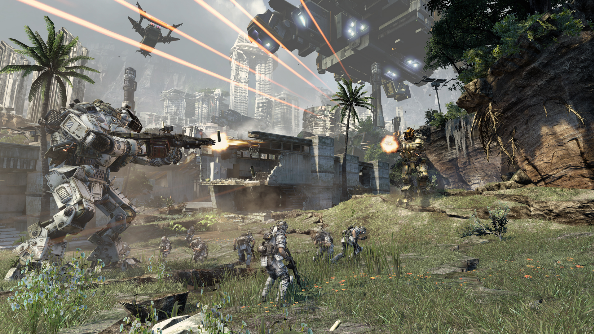
Titanfall
Breaking down the wall that divides single and multiplayer gaming, Titanfall is a multiplayer shooter with each map offering campaign narrative and scripted events. Players attempt to murder each other using conventional weapons, or hulking mechs known as Titans.
If you want to play the good looking (i.e. not last-generation) version of mech FPS and Call of Duty follow-up Titanfall, you have two options. Get it on a new Xbox One, or play it on the PC you probably already own.
Which makes Titanfall’s release on PC all kinds of fascinating. My theory is that it will sell extremely, absurdly well on PC, easily outsellling the Xbox One version. My other theory is that the PC version won’t be even seen in public until it’s available to download on Steam or Origin – Microsoft’s exclusivity agreements have meant that any discussion of the PC or PlayStation versions of the Call of Duty games were strictly forbidden.
Here’s the other thing: we’re practically starved of great FPS games on PC right now. Battlefield’s disappointing. Counter-Strike: Global Offensive is superb, but still the same Counter-Strike we’re playing for over a decade. Titanfall; with its mech on man on mech combat is just what we need.
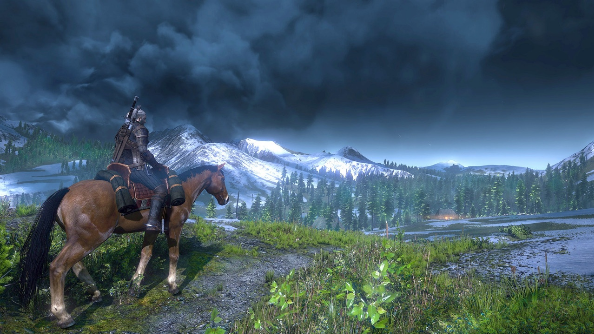
The Witcher 3
The third and final game in the RPG series, The Witcher 3 leaves behind its hub environment structure to embrace a full open-world.
CD Projekt and The Witcher have followed an interesting trajectory. The first game was a bit of a cult hit among RPG fans, but it was The Witcher 2 that really started to gain traction with the broader audience. With the Witcher 3, CDP are taking a shot at becoming a Skyrim or Dragon Age-level franchise. But can they do this without compromising what makes the Witcher series so special?
The Witcher games have always used narrative depth and smaller, detailed environments to suggest a huge, complicated fictional world without actually building one in its entirety. Where Bethesda want you to explore every nook and cranny in Skyrim or Fallout, CDP will build part of a city and part of a countryside and let your imagination and their storytelling do the rest. Now, they’ve gone and made a complete open-world for you to travel and explore. It’s a major departure for the series, and may be hard to square with The Witcher’s penchant for tightly-paced, focused storytelling.
The Witcher is also a noir-fantasy that is deeply informed by its Eastern European origins and medieval society. It’s not a setting that charms or even goes out of its way to amaze. For fans of the series, that’s one of its major selling points. As The Witcher 3 apes some of the most successful North American RPGs playbook, can it maintain its commitment to the same kind of characters and storytelling that set it apart in the first place?
These are the games that we believe will be milestones in PC gaming in 2014. Of course, these are just the games we know about. Just around the corner are announcements of new, exciting games that we don’t even know of yet. We can’t wait to see them, and hope they will offer up brilliant possibilities for gaming in 2014.
